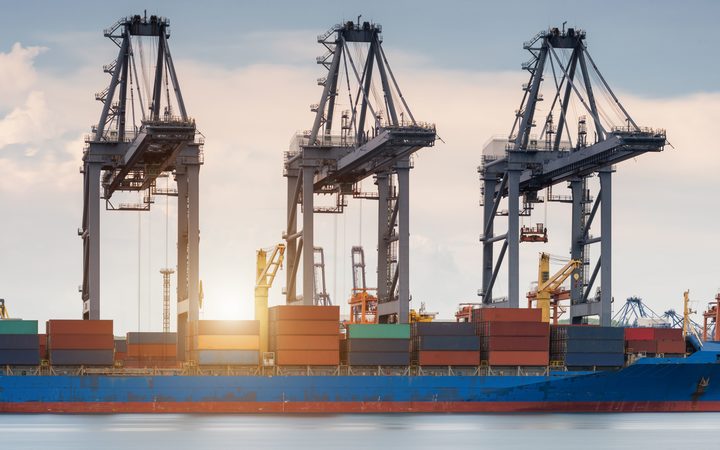Netherlands new main importer German companies exported less plastic waste in 2021
Waste as export goods? Sounds strange, but it’s normal in times of globalization – the waste is to be processed elsewhere in order to produce new goods. Germany’s role in this has changed.
German companies exported significantly less plastic waste in 2021 than before. Last year, around 697,000 tons of plastic waste were transported abroad, a third (32 percent) less than in 2020, said the Federal Association of German Waste Management, Water and Raw Materials Management (BDE) at the request of the German Press Agency in Berlin With. For example, industrial films, production waste and food packaging . Based on an industry estimate from 2019, around six million tons of separately collected plastic waste are generated in Germany every year.
The export figures for the months of January to October come from the Federal Statistical Office, the months of November and December are estimates from the BDE. Plastic waste generated in Germany must be recycled, it is processed into plastic granules or ends up as fuel in power plants. The granules are used to manufacture new products, such as polyester clothing, garbage bags or street bollards. This can also happen abroad.
BDE boss Peter Kurth assesses the decline in export volumes as positive. It shows that domestic demand for raw materials has increased. However, the industry representative pointed out that stricter import restrictions in Asian countries and the corona pandemic, including interrupted supply chains, may also have played a role. “2021 was an exceptional year.” However, the decline is so clear that a trend can be derived from it, especially since the export volume had already fallen last year, according to Kurth – at that time by nine percent.
Get out of fossil energy as soon as possible? This threatens to sell out fossil fuels and accelerate CO2 emissions. We need long-term sales prospects for the producing countries.
It is also noteworthy that the turnover made with plastic exports has remained almost the same at 259 million euros despite the slump in volume: the statisticians only show a mini minus of one percent. One possible conclusion: The overall prices and the quality of the exported goods increased.
Top jobs of the day
Find the best jobs now and
to be notified by email.
There were also significant changes to the list of importers. For years, China was the main customer. This led to side effects there: the quality of the waste that China had imported from all over the world was sometimes poor and only some of it was properly recycled – other parts remained in the environment as garbage.
Beijing reacted and tightened the import rules for waste a few years ago. The streams of waste shifted to other Asian countries, and from 2018 Malaysia was the largest importer of German plastic waste. India, Indonesia and Vietnam also received larger quantities. That had consequences. For example, German plastic waste that had been dumped illegally in the wilderness of Malaysia caused a stir. It is difficult to identify who is the culprit in such cases because the chain of stores with several intermediaries is sometimes difficult to trace.
Other Asian countries also became more restrictive on waste imports. According to the new statistics, the picture has now changed significantly. Last year, Malaysia slipped from number 1 to number 4 among the strongest importers of German plastic waste. The amount shrank from 170,000 tons to 46,000 tons. Hong Kong, Indonesia and Vietnam slipped out of the top 10. The Netherlands are the new leaders with a plastic import volume from Germany of 136,000 tons last year, which was 12 percent less than in 2020.
Exports to neighboring EU countries such as the Netherlands are considered less critical because the recycling standards there are similarly high. Turkey is in second place in the new ranking , so it went up one place – and this despite a volume that had shrunk by a quarter to 99,000 tons. In Poland, the amount increased by a fifth to 79,000 tons, putting the state in third place in the garbage ranking. Incidentally, the issue of waste trade is not a one-way street: Germany imported 446,000 tons of plastic waste last year, which was nine percent less than in 2020.
“The plastic export is an intra-European issue,” said BDE boss Kurth. It is also evident that the politically desired throttling of exports is already taking place. Are waste exports necessary at all? Generally yes, says Kurth. “We want a functioning circular economy in which waste is used as raw materials and does not end up as waste.” It could be helpful here if companies in other countries bought waste and used it in products that were not manufactured in the exporting country.
However, Kurth admitted that there are risks in plastic exports, “that cannot be explained away”. For example, the control in some non-European buyer countries is incomplete – it is not checked whether the waste is processed properly. This is a political issue that needs to be addressed.
Environmentalists are very critical of the issue of waste exports. They warn of environmental damage if the garbage ends up in poorer countries and its whereabouts are hardly checked. Turkey is now becoming a “sad number 2 of German plastic waste exports”, says
Greenpeace expert Viola Wohlgemuth. In the past, non-recyclable waste had always ended up there. “The burden is now so great that Turkey issued an import ban on certain plastic waste in 2021, for example the import of mixed and mechanically sorted plastics.” However, the ban specifications are too weak, imports of waste from Germany remain in Turkey Problem, says Wohlgemuth.
“It’s our garbage that pollutes the environment worldwide – and our responsibility that this no longer happens,” says the environmentalist and calls for stricter rules. German companies that illegally exported waste would have to take it back.
This is of particular interest to WiWo readers today Read what is still important today You here
In parts of waste management, exports to other continents also cause uneasiness. “Germany and Europe should be able to recycle their plastic waste themselves,” says Green Dot boss Michael Wiener. That would create jobs. “Further investment in recycling infrastructure is urgently needed.”
More on the subject: They hide dirt between foils, forge documents and cover up their tracks: dubious dealers and garbage sponsors send unusable plastic waste from Germany abroad. Undercover research reveals the tricks.
Read what is still important today You here
In parts of waste management, exports to other continents also cause uneasiness. “Germany and Europe should be able to recycle their plastic waste themselves,” says Green Dot boss Michael Wiener. That would create jobs. “Further investment in recycling infrastructure is urgently needed.”
More on the subject: They hide dirt between foils, forge documents and cover up their tracks: dubious dealers and garbage sponsors send unusable plastic waste from Germany abroad. Undercover research reveals the tricks.
© Handelsblatt GmbH – Alle Rechte vorbehalten. Nutzungsrechte erwerben?
Note: This article have been indexed to our site. We do not claim legitimacy, ownership or copyright of any of the content above. To see the article at original source Click Here














